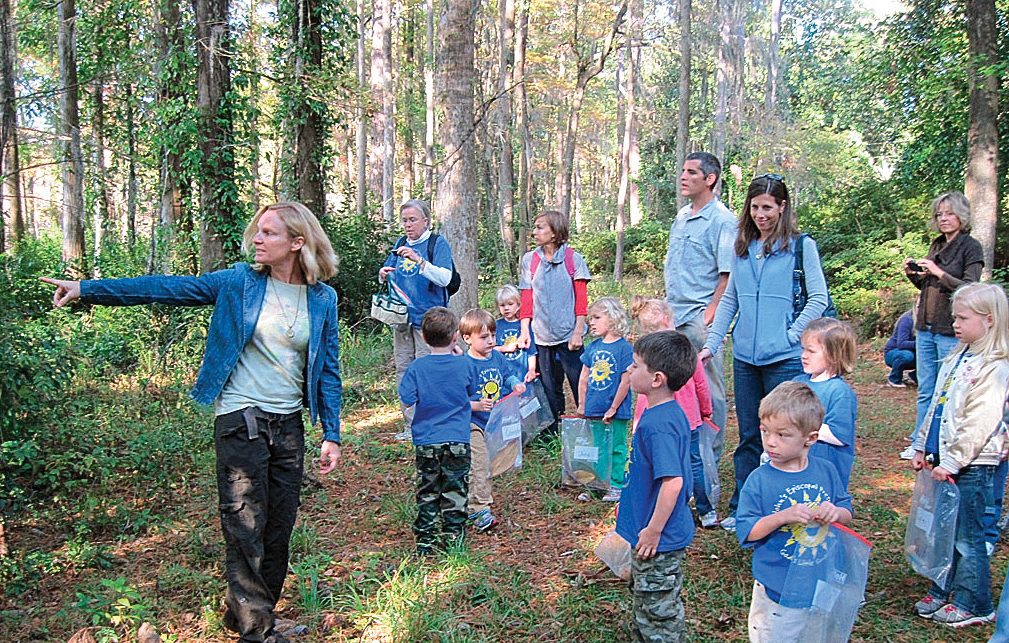By Thomas van Arsdale
Intern
The Cape Fear River Watch will host its summer Eco-Camp, a hands-on opportunity for kids ages 9-12 to learn about their impact on the watershed.
A watershed, explained Kay-Lynn Plummer-Hernandez, Cape Fear River Watch education specialist, is an area of land that goes from a high point to a low point. When it rains, all of the rainwater will condense in a specific body of water.
The Cape Fear River basin is the largest river basin in the state of North Carolina. To protect and improve the water quality and environmental sustainability of the lower Cape Fear, Wilmington citizens began the nonprofit Cape Fear River Watch in 1993. Its members are committed to educating local citizens, advocating on the river’s behalf and taking action to preserve the region’s environmental future.
“Eco-Camp helps kids understand their role in controlling nonpoint source pollution, or the amount of pollution that starts in the watershed and ends up polluting the river,” Plummer-Hernandez said during a July 25 phone interview.
Eco-Camp, Aug. 4-8, will begin with the Enviroscape, a scaled-down topographic model of a watershed that will visually demonstrate how nonpoint pollutants enter the waterways and affect wildlife, water quality and human health.
“We then talk to the kids about the alternatives to using pesticides and fertilizers, the importance of planting native plants, simple things like where to wash a car: in the driveway, but up on the grass,” Plummer-Hernandez said.
During the five-day camp, kids will spot alligators, yellow-bellied sliders and the carnivorous Venus flytrap while cruising up the northeast Cape Fear river, hiking Carolina Beach State Park with a park ranger and paddleboating around Greenfield Lake.
“Because Greenfield Lake is a 90-acre wetland ecosystem,” Plummer-Hernandez said, “it cleans up all of the pollutants before they make it to the river. So for the kids it’s something where they can easily see how all these nonpoint pollutants affect an urban waterway.”
During the last day of the Eco-Camp, kids will ride on the Southport ferry to see where two major river basins converge and enter the Atlantic Ocean.
“It’s a good place to show them the big picture of where everything meets,” Plummer-Hernandez said. Kids will comb the beach for trash, identify shells and birds, eat lunch on the gazebo and talk about the importance of land conservation.
Plummer-Hernandez believes Eco-Camp will encompass the entire Cape Fear River Watch mission statement.
“The Eco-Camp utilizes education, advocacy and action to encourage kids to protect and improve the lower Cape Fear River basin. We believe that every child should be eligible to be educated,” she said. More than half of this year’s campers will receive full scholarships to attend.
“When I became the Cape Fear River Watch Education Specialist, I wanted to be able to provide a fun, educational experience for children no matter their family’s income,” Plummer-Hernandez said. Supported with a $3,100 grant from the Landfall Foundation, 19 campers from low-income families will attend completely free.
“These are kids that have had fewer opportunities and probably wouldn’t be exposed to the ecological aspects of the Cape Fear River,” Landfall Foundation President Bill Hamlet said during a July 26 phone interview. “Think about when you were growing up in the 9-to-12-year-old range, just old enough to be adventuresome. It is the perfect time to emphasize science, and Eco-Camp is hands-on science. This is not theoretical.”
The Landfall Foundation awarded 71 grants to local 501(c)(3) nonprofits in 2013, totaling more than $280,000. This is the second year the foundation will sponsor Eco-Camp. Hamlet said the Eco-Camp program received a grant because it matches the ideals of the Landfall Foundation to promote education.
“The watershed affects your drinking water. It affects the fish and oysters. It affects everything,” Hamlet said. “The Cape Fear River is the historical basis of the Port City, and the Eco-Camp gets kids interested in marine biology and their city.”
Cameron Weaver, father of a second-year Eco-Camper agreed.
“Last year, Eco-Camp gave my son Matthew the opportunity to be a naturalist in the outdoor setting under the supervision of wildlife specialists, and also expand his interest in marine biology,” Weaver said during a July 28 phone interview. “It opens the door for kids to find fun in nature, and exposes them to the ways in which they can help keep the river clean, and reach out to people in the community.”
This year, Matthew Weaver was hoping to attend the Waterkeeper Camp, a more sophisticated program on water quality monitoring and mapping, previously hosted by the Cape Fear River Watch, but due to a lack in funding, is not offered this summer.
“It’s awesome what the Landfall Foundation has contributed, but I hope other organizations will see the great benefits of this program and want to donate to it in the future,” Weaver said. “It is so beneficial to a child’s education, and inspires them to pay more attention to science in school.”
The Cape Fear River Watch will host Eco-Camp from Aug. 4-8, 8 a.m. to 5 p.m. Enrollment is $190. For more information or to register for the camp, call 910-762-5606 or visit www.capefearriverwatch.org/education




